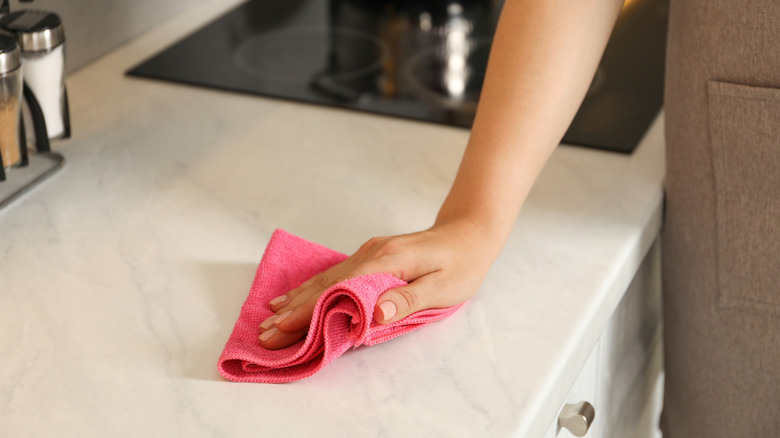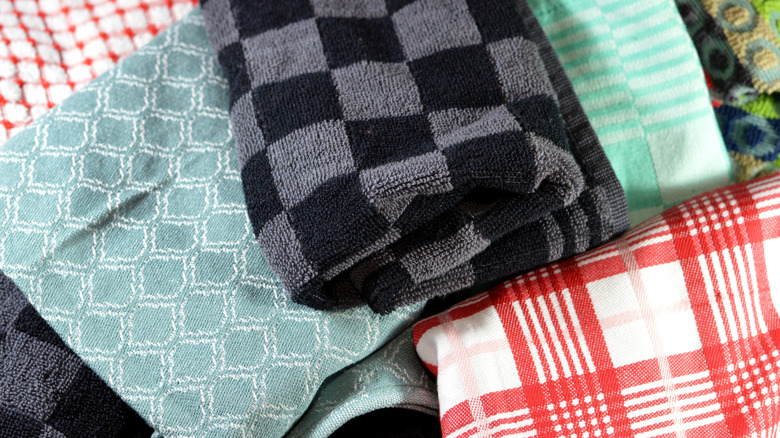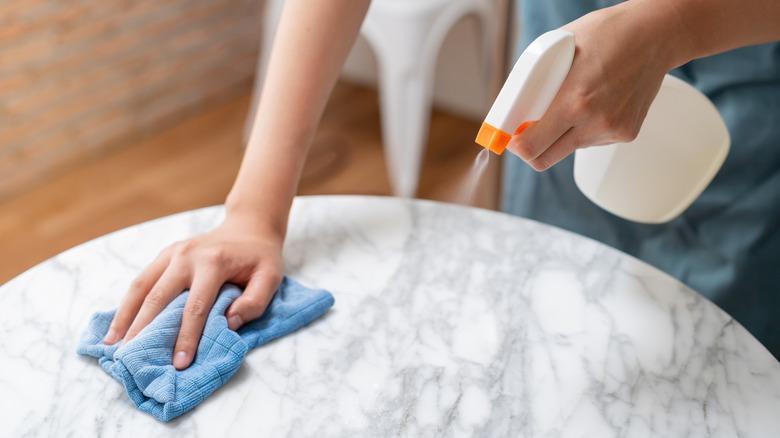Why You Should Always Use A Microfiber Cloth On Marble Countertops
Between cotton, disposable wipes, and a wide variety of specialty cloths, there are tons of options for cleaning your countertops. The best one for marble is one that is not too abrasive because, like acid or high heat, a cloth can damage your marble by being too harsh for the surface. Whether you have brand new marble countertops that you want to keep in great condition or want to focus on maintaining old, reliable ones, it is important to use a soft cloth like microfiber, which is the best option for marble. Microfiber is a soft and highly absorbent material that is also extremely durable, making it a simple and easy reusable option to use throughout your home.
When it comes to countertops, marble is a popular and beautiful option, but it has its difficulties. Although it is stone, it is prone to etching, chipping, and damage from heat. Marble is a soft stone, which means that acid from foods, cleaners, and more can slowly eat away at the surface over time. The resulting dull areas are called etches, and they can be tough and pricey to fix. It is far better to take the time to learn the best way to clean marble countertops and how to properly care for them using a microfiber cloth than to cause accidental damage.
Benefits of microfiber cloths
Microfiber cloths are wonderful tools for cleaning throughout your home. From windows to floors, the list of what you should be cleaning with a microfiber cloth is extensive. The fact that they are less abrasive than other materials, along with benefits such as absorbency and positive charges, makes the product perfect for countertops, though. They are great for quickly soaking up messes and spills, and the positive charge allows microfiber cloths to attract dirt and grease with negative charges, sometimes meaning you do not need to use chemical cleaning products. This is especially good for marble, as products like bleach, chemical disinfectants, and even vinegar can ruin the stone countertops. Using a microfiber cloth can allow you to clean without these items and avoid damage.
On top of the cleaning benefits, opting for reusable microfiber cloths can be eco-friendly. Using a reusable rag of any kind reduces waste, but microfiber has some additional environmental benefits. The production of microfiber cloths utilizes less water and energy than the production of other cloth materials, so it is more environmentally friendly to make. However, a microfiber cloth does require fossil fuels to produce, and it is not a biodegradable material. Overall, if you are upgrading from paper towels or are looking for a cleaning product that allows you to use fewer chemical cleaning products around your home, then switching to microfiber is definitely worth it for you and your marble countertops — especially if you learn to properly use and care for your cloth to make it last.
How to use microfiber cloths to clean your marble counters
The best way to keep marble countertops looking fresh is to use a microfiber cloth and a solution of water and mild soap, such as dish soap. Combine about 1/4 cup of dish soap with about a gallon of warm water in a sink or bucket. Instead of dish soap, you may also use a mild detergent or a pH-neutral soap designed for stone surfaces. Soak the rag and squeeze out any excess water until the rag is damp, then gently wipe down the countertops.
There are a number of common mistakes to avoid if you have marble countertops. Using excess water and scrubbing too hard can be damaging to the stone, so be careful as you work. When finished, dry the countertops with a clean, dry microfiber cloth, and you will be left with a fresh and dirt-free kitchen without any damage to your stone.
When it comes to maintaining the cloth, you can either hand wash or machine wash it. Start by shaking out the cloth to remove any debris. To hand wash, add the cloths to cool water and scrub any stained areas. Allow the cloths to soak for at least 15 minutes, then swirl them around before rinsing them in running water and allowing them to dry. To machine wash, use cold water and only a small amount of gentle detergent without scents or additives. Halfway through the cycle, pause the machine and allow the cloths to soak for at least 15 minutes before resuming the cycle.


